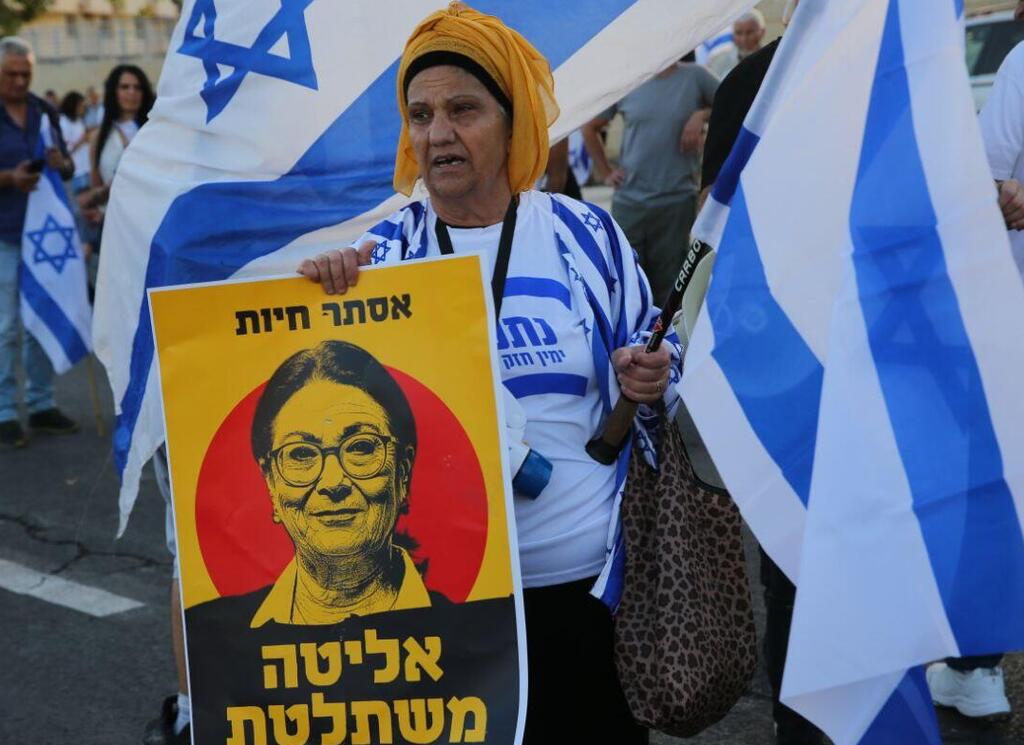Getting your Trinity Audio player ready...
About 10,000 people from the right-wing camp protested Thursday evening at what was dubbed the "Freedom Demonstration" in Jerusalem ahead of the hearing in the High Court of Justice on petitions against the amendment to the Basic Law: Judiciary that ends the reasonableness standard, under the title: "They will not take away our voice."
More stories:
Finance Minister Bezalel Smotrich attacked the president of the Supreme Court Esther Hayut, saying in front of the crowd 'Don't you dare invalidate Basic Laws." Information Minister Galit Distel-Atbaryan joined the attack, addressing Attorney General Gali Baharav Miara: "If you throw our election in the trash - you have nothing to do with me."
3 View gallery


About 10,000 demonstrators joined a right-wing protest against the Supreme Court in Jerusalem
( Photo: Roni Green Shaulov )
Shuttles left from all over the country, including from the Jordan Valley, Binyamina, the West Bank, and Mount Hebron, to allow the participants to reach the demonstration. There was a demonstration of people dressed as bananas – shouting: "Banana Republic of the High Court." Among the protest banners waved by the protestors, there were also signs bearing the inscriptions "Justice for Yigal Amir," who assassinated Prime Minister Yitzhak Rabin, and "Justice for Amiram Ben Oliel," convicted of killing three members of a Palestinian family when he firebombed their house - which some of the protesters tried to hide and get rid of.
Knesset Speaker Amir Ohana's speech, in which he threatened that "the Knesset will not humbly accept its trampling," was projected on a screen set up in front of the Supreme Court. The organizers of the protest claimed that in a scenario where the amendment to the Basic Law: Judiciary is rejected, the High Court will drag the country into a constitutional crisis. "It (the High Court) does not have the authority to disqualify the people's choice," they said.
Minister of Settlements and National Missions Orit Struck told the crowd of demonstrators: "You are right to demand governance. We came here to make it clear that even if the dictatorship is called a democracy a thousand - we will not forget what democracy really is. We will not forget what our voters sent us to do, we will bring what you sent us bring."
Knesset lawmaker Boaz Bismuth of the Likud Party reinforced Struck's words. "Netanyahu reached out for talks, but Gantz rejected it," he said. "The truth is, and you know it very well, Lapid and Gantz are prisoners of the protest. Remember well - the legal reform is our declaration of freedom. We will not give up, and will work toward a balanced committee for appointing judges. One in which justice will not only be spoken - but also seen."
Distel-Atbaryan added: "Blessings on our ultra-Orthodox brothers, and especially blessings for the sages, thanks to whom the Holy One, blessed be He, protects us. Gali Baharav Miara, if you throw our election in the trash - you have to answer to me and two million other citizens. Your voice is not worth an inch of the voice of my Persian father. We will never break. We are in charge – and you will not take it so lightly. We are not afraid of you."
Amid boos from the crowd, Smotrich addressed Supreme Court President Esther Hayut. "Even if you think that the amendments we are introducing to the judicial system are wrong, and even if you think they should be done differently, invalidating a Basic Law is the end of Israeli democracy," he said. "I urge you from here not to make a decision that will tear apart the people of Israel and the IDF, and separate families. Don't you dare invalidate Basic Laws; the responsibility is on you."
The Minister for the Advancement of the Status of Women's Status called the protesters against judicial reform "democratic dictators," accused them of "desecrating the word democracy," and declared: "We will not give in to them, even if we have to fight for another 10 years, we will not give in to them, as long as I am in the Israeli government and Knesset, I will not let them steal the country - and that is what they want to do. We will fight to pass the reform."
One of the protesters, who came from the town of Elyakhin near Hadera told Ynet: "I am here to strengthen my government. If they reject the law next week, currents will arise that will feel that they are not respected and there will be anarchy. I don't know about this expression 'constitutional crisis' - it is an expression of lawyers who want to scare us. The law says they can't discuss these things."
3 View gallery


Right-wing protestor holds poster of Supreme Court President Esther Hayut: 'Elite Rule'
(Photo: Alex Kolomoisky)
The protest took place under the leadership of Rise Up (Takuma) 2023, and in cooperation, among others, of Im Tirtzu, Sovereignty, My Israel, Ad Kan, Torat Lahima, Hootam, and All Israel. "The High Court is debating Basic Laws in an undemocratic way, while trying to hijack and pass the new constitutional revolution and create precedents," said Takuma 2023 chairman Berla Crombie.
"Instead of curbing judicial activism and taking into account the will of the majority of the people, the High Court of Justice is even doing more and trying to impeach a prime minister who received a majority of the votes of the voters. Our call to the High Court is not to deviate from the judicial activism that it attributes so much to itself. It is impossible in a democratic country for the High Court to discuss basic laws, after over the years they explained to us that the entire constitutional revolution of Aharon Barak is based on the basic law of human dignity and freedom," he said.
Knesset lawmaker Avihai Bovaron of the Likud Party, one of the heads of Takuma 2023, added: "If 15 High Court judges testify that they are sovereign, the people will have to have their say. How exactly will they have their say? I don't want to go there. I hope we will not have to reach a point where we sit on the bench and decide how to return the power to the people."
"I want to hope and believe that the court is smart enough not to tell the people and their representatives, 'You are not the owner of the house here, we live in a democracy that is not a democracy," Bovaron added. "The 15 judges of the High Court are the sovereign.' The majority of the people decided on a certain law, at the level of a basic law. This is a fence that the court itself put in place to preserve the point of balance between the authorities. If the court breaks through this fence, it will uphold our claim that we live in an imbalance between the people and the court, anf the question of who is sovereign."
Earlier this week, the High Court of Justice refused to postpone the hearing on the petitions against the end of the reasonableness standard, and decided that it will be held on September 12. At the same time, this week the High Court agreed to postpone a significant hearing regarding petitions on the non-convening of the committee for the selection of judges , against the backdrop of the firm position of the attorney general that the committee should be convened immediately. The High Court of Justice will discuss the petitions against the non-convening of the committee, submitted by Yesh Atid and the Movement for Quality Government, on September 19.


